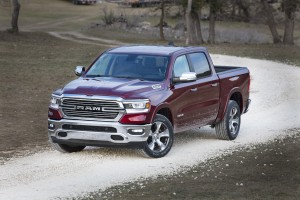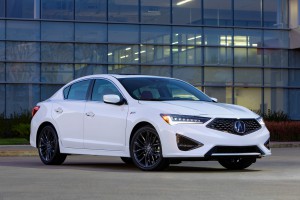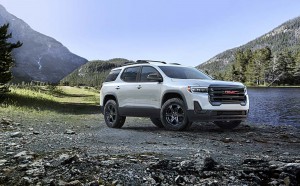
GM’s sales were crimped due to the 40-day strike by the UAW; however, it still hit record sales results on its crossovers, like the GMC Acadia.
This story has been updated with additional results from more automakers.
Sales of new vehicles in the United States topped 17 million units for the fifth consecutive year despite a strike at General Motors and sales declines by big manufacturers such as Fiat Chrysler and Toyota.
The factors working against topping the big number were offset by modest gains by Honda and Hyundai and record results by Tesla.
Despite the lengthy strike, GM’s deliveries took only a minor hit, falling just 2.3% for the year, with the company reporting it delivered 2,887,046 vehicles in 2019. Deliveries were hit hardest, not surprisingly, during the fourth quarter, where they fell 6.3%.
(Automakers to surpass 17M units sold for the fifth year in a row)
However, the company still enjoyed a record year when it came to its crossover line-up. Crossover deliveries totaled 1,165,769 for the year, up 12.7% versus 2018. Truck sales fell only slightly despite the dwindling supplies due to the strike.
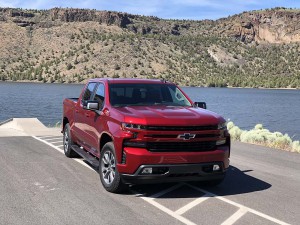
Despite the 40-day strike, GM’s full-size truck sales were still solid for 2019, although down slightly on a year-over-year basis.
“We’ve focused our resources on what our customers want – crossovers and trucks – and that has paid off,” said Kurt McNeil, vice president, U.S. Sales Operations. GM’s year-end 2019 inventory was 616,023 units, down 18.4% from last year.
“Our fourth-quarter stocks were leaner than we wanted, but as we get ready to launch our all-new full-size SUVs, we look forward to another solid year in 2020,” McNeil added.
GM’s fleet mix was 19.7% in the fourth quarter and 21.8% for the year. Average transaction prices were a record $37,558 in the fourth quarter and a record $36,844 for the year, above industry averages, according to J.D. Power PIN. The company’s incentives as a percent of ATP were 14.1% for the fourth quarter and 13.4% for the year, according to J.D. Power PIN.
Meanwhile, FCA said U.S. sales for the fourth quarter were 542,519 vehicles, down 2%, while sales for the year were down 1% at 2,203,663 vehicles. Retail sales were 419,273 vehicles during the quarter. Fleet accounted for 22.7% of total sales.
The Ram brand led the way with record-setting sales of 190,655 for the quarter and
703,023 vehicles for the year – an 18% increase compared with 2018. It was the highest level of sales since Ram became a standalone brand in 2009.
“Our dealers did an outstanding job in 2019, not only with meeting consumer demand, but also handling the introduction of the redesigned Ram Heavy Duty and new Jeep Gladiator,” said Reid Bigland, head of U.S. Sales. “We have read the expectations that sales may slow a bit in 2020. However, we believe there is still plenty of demand in the market and we are ready for a new year.”
Ford will not release sales until Jan. 6. However, among those who did, Tesla enjoyed a strong final quarter, delivering a record 112,000 vehicles during the final three months of the year, which allowed the electric carmaker to surpass Chief Executive Elon Musk’s sales target for all of 2019.
With its fourth-quarter figures, Tesla ended 2019 with 367,500 deliveries of its Model 3, Model S and Model X vehicles. Earlier in the year, Musk said he expected Tesla to deliver at least 360,000 cars for the year. Tesla said its deliveries rose 50% from 2018.
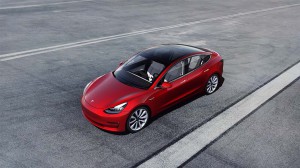
The Tesla Model 3 sold like gangbusters last year, helping the company set a new sales record in 2019.
Hyundai Motor America reported total December sales of 64,720 units, a slight 1% decrease in comparison with December 2018. For the year, Hyundai sold 688,771 vehicles, the best calendar year total sales since 2016.
The total year sales results were a 3% volume increase, while retail sales were up 5%. Hyundai SUVs set an all-time annual record with 368,160 units sold, a 20% increase compared with 2018. SUV sales represented 53% of total sales, the highest SUV mix in Hyundai history, up from 46% last year.
(Carmakers riding big December sales to pass 17M units)
Subaru of America set a new U.S. sales record of 700,117 vehicles for the 2019 calendar year, an increase of 3% compared with the previous annual record of 680,135 vehicles set in 2018. However, Subaru closed out December 2019 with a 3.4% decrease compared to the same period last year due to decreased inventory caused by Typhoon Hagibis in Japan.
American Honda sales of cars and trucks rose 0.2% in 2019. Honda brand trucks set new annual record with gain of 3.4% for year. Acura SUVs remained strong, with ILX sales growing 30.3% for the year. Honda, however, suffered a setback in December as sales by the Honda brand dropped 12.9% and Acura sales dropped 2.8%.

The 2020 Hyundai Palisade helped the South Korean automaker to a strong sales year in the U.S. last year..
“In a highly competitive market, American Honda posted increased sales in 2019, including new records for both light trucks and electrified vehicles,” said Henio Arcangeli Jr., senior vice president of the American Honda Automobile Division.
“Honda also bucked industry trends by achieving a second straight year as the retail number one passenger car brand in America, so we head into 2020 with strong momentum.”
It wasn’t a banner year for all automakers. As mentioned earlier, Toyota Motor North America sales were down, reporting December 2019 sales of 207,373 vehicles, a decrease of 6.1% on a volume basis and down 2.4% on a daily selling rate basis versus December 2018.
For the year, TMNA reported sales of 2,383,349 vehicles, a 1.8% decrease on a volume and DSR basis.
Toyota division posted December sales of 172,048 units, down 7.2%. For the year, Toyota division reported sales of 2,085,235 vehicles, down 2% on a volume and DSR basis.
“It was a strong year for Toyota. We retained our number one spot in hybrid, passenger car, SUV, small truck and retail sales,” said Jack Hollis, group vice president and general manager, Toyota division. “But we’re not stopping there. We’re preparing for an even better year in 2020 as we debut new vehicles and continue to dominate the hybrid and mobility space.”
Lexus division posted December sales of 35,325 vehicles, down 0.6% on a volume basis and up 3.4% on a DSR basis. For the year, Lexus reported sales of 298,114 vehicles, down 0.1% on a volume and DSR basis.
Sales of both Toyota and Lexus hybrid vehicles increased by double digits during 2020.
Nissan Group announced total U.S. sales for December 2019 of 104,781 units, a decrease of 29.5% versus the prior year. It also announced total calendar year 2019 U.S. sales of 1,345,681 units, a decrease of 9.9% compared with the prior year.
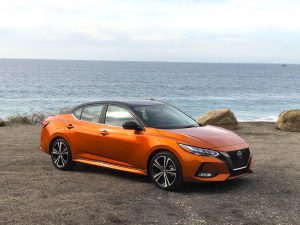
The new Nissan Sentra remains affordable, with a base price just under $20,000. However, it wasn’t enough to offset a loss for the full year.
While not all automakers reported sales increases this year, on average, they did make more for each vehicle they sold, according to Kelley Blue Book analysts.
“New-vehicle transaction prices finished the year on a high note, with the average rising nearly 2% and approaching the record set in November 2019,” said Tim Fleming, analyst for Kelley Blue Book.
(Dealers optimistic despite dour forecasts for auto sales in 2020)
“However, as retail demand fell in 2019, dealer discounts grew, approaching 7% of MSRP in December – the highest since July 2009. On a positive note, the discounts appear to be working as the average days in inventory fell by two days from the previous month. With sales expected to be down in 2020, anticipate the pressure to continue on new-car prices and incentives.”

